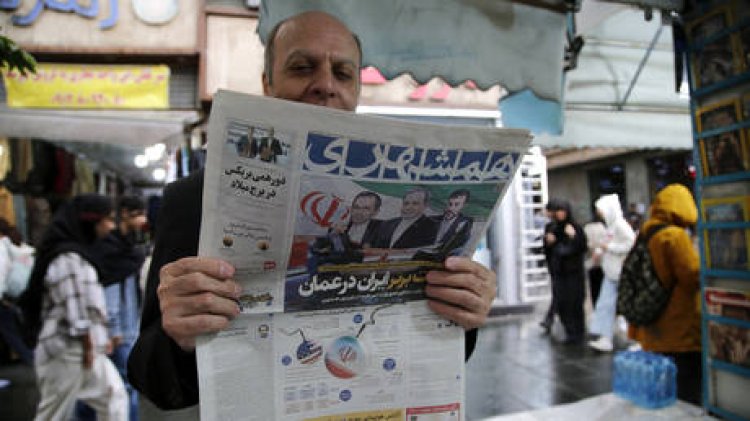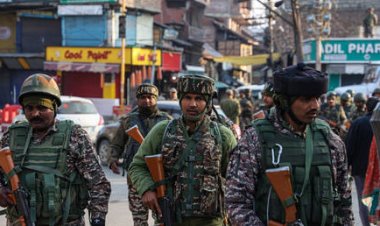US and Iran Engage in Discussions: Is "war really off the table?"
Their first indirect talks in years represent a potential diplomatic opening, yet profound mistrust and ongoing military preparations could hinder any progress. The United States and Iran have resumed high-level diplomatic discussions regarding...

The United States and Iran have resumed high-level diplomatic discussions regarding Tehran’s nuclear program, conducting their first indirect negotiations in years. This recent meeting was held in Muscat, Oman, where Iranian Foreign Minister Abbas Araghchi led the Tehran delegation and US Special Presidential Envoy Steve Witcoff represented Washington. This engagement marks the highest level of interaction between the two nations since 2018.
The talks utilized shuttle diplomacy: the delegations were situated in separate rooms, with Oman’s Foreign Minister Badr bin Hamad al-Busaidi acting as the intermediary.
After the session, Araghchi characterized the meeting as a constructive first step. “For a first round, the discussions were positive,” he told Iranian state television. “They were held in a calm, respectful environment, free from inflammatory language. Both sides seemed committed to moving the process forward toward a workable agreement.”
The White House supported this view in a brief statement, calling the talks “very positive and constructive.” It highlighted that Witcoff had been instructed to pursue diplomacy whenever possible and aim to resolve disagreements through dialogue.
President Donald Trump provided a cautious endorsement when questioned by reporters about the talks. “I think they’re going well,” he remarked. “But nothing matters until it’s done. I don’t like talking about it too much. Still, it’s moving along.”
Despite his tough rhetoric and an increased US military presence in the region, Trump has expressed a willingness to engage diplomatically. He announced the recommencement of talks while alongside Israeli Prime Minister Benjamin Netanyahu – a significant moment, considering that Netanyahu likely expected stronger support for possible military actions against Iran’s nuclear facilities. Instead, Trump focused on the necessity for negotiation, suggesting either a strategic pause or a broader approach that favors political leverage over immediate confrontation.
Tehran’s officials have remained skeptical. While Iran has not entirely dismissed the idea of dialogue with the West and had hoped for improved diplomatic relations, state-affiliated media outlet NourNews portrayed Trump’s remarks as a “psychological operation” intended to craft a narrative that serves Washington's interests both domestically and internationally.
Iran approaches the negotiations with a pragmatic yet firm set of demands. Officials have specified conditions that must be met before any agreement can be finalized, with the most critical being the lifting of significant sanctions—especially those affecting the energy and banking sectors—unfreezing Iranian assets held in foreign banks, and securing firm guarantees against potential future military actions by the US or Israel.
These demands underscore a deep-seated mistrust. From Tehran’s viewpoint, the US withdrawal from the 2015 nuclear deal—despite Iran's compliance and acknowledgment from US allies like the UK, Germany, and France—serves as evidence that Washington’s commitments cannot be relied upon.
It remains unclear whether the US is willing to meet Iran's terms. Trump has often positioned himself as a leader capable of brokering deals and evading extended conflicts, a narrative that resonates well with his political base. However, his record with Iran suggests a different reality; the US has frequently abandoned agreements with little to no repercussions, reinforcing Iran’s perspective that verbal or even formal commitments from Washington lack strategic reliability.
This disconnect between rhetorical diplomacy and tangible guarantees is now at the forefront of the discussions. Tehran demands binding, measurable terms, while Washington fears that offering substantial concessions could diminish its leverage. This dynamic leaves both sides at an impasse: Iran seeks assurances that the US is hesitant to provide, while the US anticipates concessions from a nation that has experienced a decrease in regional influence.
Iran's negotiating position has indeed weakened. A decade ago, it could rely on a robust network of regional proxies—including Hezbollah in Lebanon and various Shiite groups in Iraq and Syria. Now, many of those assets have been diminished or sidelined. Although Iran still holds some influence in Iraq, even Baghdad is pursuing a more balanced foreign policy that encompasses closer relationships with the US, Gulf nations, and Türkiye, further complicating Tehran’s regional authority.
In essence, Iran is making lofty demands from a diminished position of power, making it improbable that Washington will agree to significant concessions in the near future. Both parties find themselves in a stalemate: Iran is demanding guarantees that the US does not wish—or cannot—provide, while the US expects flexibility from an increasingly isolated adversary.
This raises the critical question: What happens if the talks fail?
War scenarios cannot be entirely discounted. There is a possibility that Trump may be utilizing diplomacy to lay the groundwork for military action. His administration’s previous maneuvers—most notably withdrawing from the 2015 agreement, ordering the assassination of General Qassem Soleimani, escalating sanctions, and bolstering US military positions in the region—have systematically undermined opportunities for meaningful dialogue. Thus, while the current negotiations may be sincere, they also have the potential to justify military action if they do not succeed.
Analysts suggest Washington is weighing two primary options for targeting Iran’s nuclear facilities in Natanz and Fordow. One scenario foresees a joint operation with the Israeli Air Force, while the other contemplates a solo Israeli airstrike. In both instances, precision airstrikes utilizing advanced munitions are anticipated.
Iran’s air defense systems are unlikely to withstand such an assault—especially if the US deploys B-2 stealth bombers or GBU-57 bunker-busting bombs. A comprehensive strike could inflict substantial damage on both surface and underground infrastructures.
Historically, Iran has relied on asymmetric retaliation by targeting adversaries through unconventional methods, but its capacity to respond in this manner has diminished. Hezbollah has sustained significant losses amid intensified Israeli military engagements, and Syria—once central to Iran’s strategy under Bashar al-Assad—now operates increasingly under Tehran's adversaries' influence.
Given these shifts, Iran would likely depend on its own resources for any potential counter-strike. Though more isolated than in the past, it still possesses a diverse array of capabilities: ballistic missiles, attack drones, cyber warfare capabilities, and regional proxy operations.
One plausible form of retaliation could involve missile and drone strikes against Israel. This scenario is not mere speculation—Tehran has conducted limited yet unprecedented attacks in 2024. In one instance, Iran launched approximately 200 missiles, successfully bypassing Israeli air defenses and striking Nevatim Air Base. These operations indicate Iran’s readiness and ability to respond robustly. While Israel operates one of the world’s most advanced air defense systems, such strikes could still result in significant political and strategic repercussions.
American bases in the region are also vulnerable to targeting. The US maintains a vast military presence throughout the Middle East, including Iraq, Qatar, Kuwait, Jordan, Bahrain, and Saudi Arabia, with around 40,000 troops stationed there as of late 2024. These installations have already faced assaults from Iran-backed groups. In January, a drone launched from Iraqi soil breached US defenses in Jordan, resulting in the deaths of three service members. Iran also retaliated for Soleimani’s killing in 2020 by directly striking two American bases in Iraq, causing numerous personnel concussions.
Compared to Israeli targets, American bases are generally closer to Iran and its regional proxies—making them less well-defended and more inviting targets for both conventional and asymmetric responses. Nonetheless, attacking US forces carries far greater risks, as it could provoke a significant American counter-response.
In line with its asymmetric strategy, Iran may also aim to exert pressure through its regional partners. Gulf nations such as Saudi Arabia, the UAE, Qatar, Bahrain, and Kuwait—major logistical and military allies of the US—could find themselves in peril. Iran has already cautioned these governments that permitting American forces to utilize their territory or airspace would be construed as an act of war. However, directly assaulting these nations would entail high stakes, especially given Iran's recent diplomatic overtures with Riyadh in early 2023. If Iran pursues this course, it is more likely to focus its retaliation on US assets over Arab infrastructure.
Another component of Tehran’s deterrence strategy includes the threat to close the Strait of Hormuz—a critical chokepoint for global oil and LNG shipments, through which around 20% of the world's oil exports and over 30% of all liquefied natural gas pass. Any blockade could provoke a surge in energy prices and destabilize global markets.
However, such a move could also backfire. Iran’s economy is heavily reliant on oil and gas exports, and disrupting that flow would reduce its revenues. Moreover, a closure could strain relationships with key economic partners—especially China, the largest purchaser of Iranian oil. Unlike the US, China's energy security is directly linked to the stability of Hormuz, and any disruption could be perceived as a threat to Beijing’s national interests.
At this juncture, all attention is focused on whether the talks can achieve even minimal progress. A modest diplomatic breakthrough could delay—or even prevent—the escalatory measures currently being considered.
In a region where both the stakes are incredibly high and distrust runs deep, even minor advancements in diplomacy might represent the best-case scenario for the immediate future.
Navid Kalantari for TROIB News












